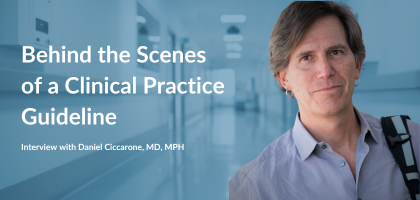Blog
Behind the Scenes of a Clinical Practice Guideline

The ยายืสำฦต (ยายืสำฦต) and the developed the Clinical Practice Guideline on the Management of Stimulant Use Disorder, which includes recommendations for the treatment of Stimulant Use Disorder (StUD), stimulant intoxication and withdrawal, and secondary and tertiary prevention of harms associated with stimulant use.
The purpose of the guideline, published in November, is to assist clinicians in treating individuals with StUD, including adolescents and individuals who are pregnant, as well as those experiencing stimulant intoxication or withdrawal, and those who are at high risk of developing StUD.
“It came out quite well,” said Daniel Ciccarone, MD, MPH, one of 14 members of the Clinical Guideline Committee who worked on the guideline for about two years. “The people who orchestrated this, both from ยายืสำฦต and AAAP, did a great job getting us together to make decisions and keeping the train moving.”
As rates of StUDs continue to rise, the potency of stimulants and the rates of stimulant use in combination with opioids are also increasing. Combined, these factors have led to overdose death rates for cocaine tripling and those for other stimulants, including amphetamine, methamphetamine, amphetamine, and prescription stimulants, increasing 12-fold during the past 10 years.
Dr. Ciccarone acknowledged that critics might suggest that a handful of studies are not enough to promote these guidelines. The dramatic increase in overdose death rates and other challenges surrounding StUDs in recent years, however, demands that something must be done, particularly when medications exist that can be used to help turn the tide.
“What the committee decided is it's good enough to suggest it,”said Dr. Ciccarone, Justine Miner Professor of Addiction Medicine at the University of California San Francisco. “Yes, we want more clinical trials, more support for it, but we're not going to say, ‘Under no circumstances don't use.’ We're not going to go to the negative. We're going to go to a mild positive, which is, ‘Please consider the use of these medications for methamphetamine use disorder.’ Maybe that's a mild recommendation, but we went with what the evidence said and came up with the best foot-forward approach that we could.”
Although the FDA hasn’t approved pharmacological treatments for StUD, that doesn’t mean effective, evidence-based treatments don’t exist.
“In medicine, it's perfectly legal and ethical to use medications outside of pure FDA guidance, thumbs up or thumbs down -- you're allowed to use them as an indication,” Dr. Ciccarone said. “If you do it willy-nilly without any clinical data, then you may be subject to lawsuits, but if you do it – based on professional community consensus – and you say, ‘Oh, look, there are guidelines now that support this combination. So, I used it based on those guidelines, not based on FDA, but based on ยายืสำฦต/AAAP guidelines. This authority behind these guidelines is a permissive authority.”
So far, the guideline has been endorsed by The American College of Medical Toxicology, the American Society for Adolescent Psychiatry, and the American Society of Addiction Nursing. Dr. Ciccarone said he’s proud of what he was able to contribute to the project and for how it turned out.
“There was no one on the committee who was anything less than senior and top expert,” he said, “So I felt privileged to be there and I feel proud of the results.

